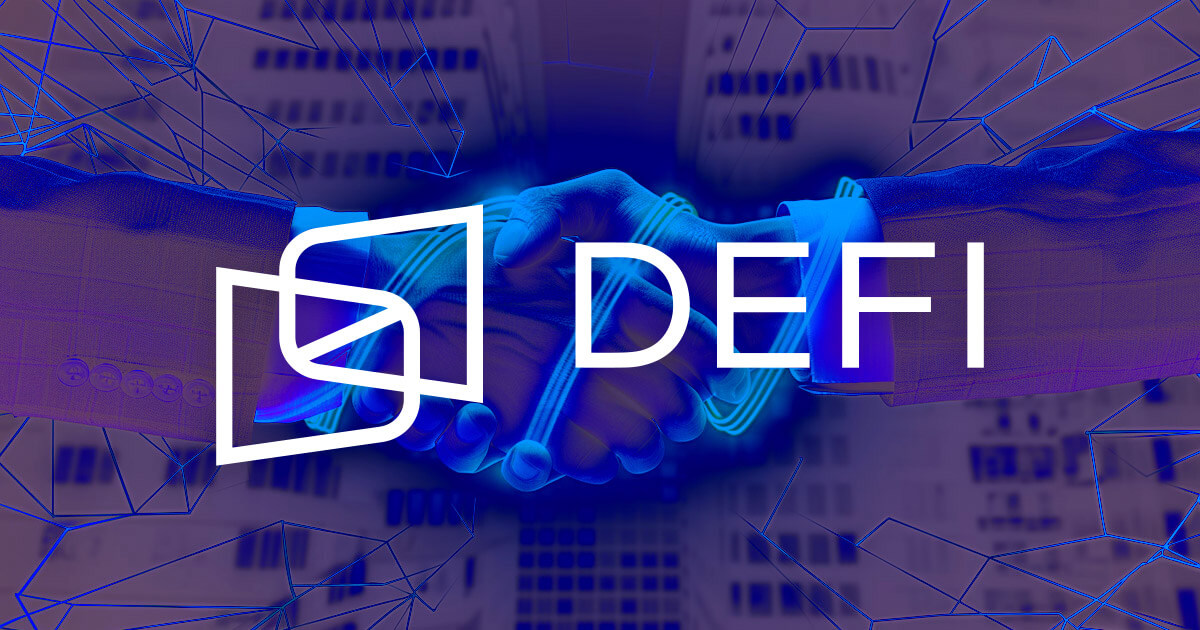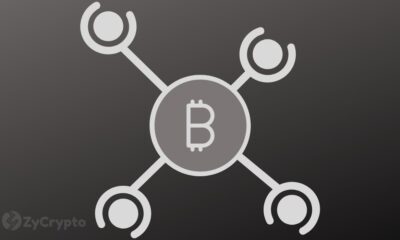DeFi
Fixed-Rate vs. Floating-Rate Loans in DeFi

Sponsored Content
By removing centralized gatekeepers, DeFi (decentralized finance) has created new opportunities for lending and borrowing. Today, within the burgeoning DeFi ecosystem, lending protocols are facilitating billions in crypto-backed loans. Intriguing, right? However, dealing with these open financial systems can be tricky, which may deter traditional users.
If you’re interested in DeFi lending, it’s important to understand the different loan structures available. Unlike traditional banks, which primarily offer fixed-rate and variable-rate loans, DeFi incorporates a slight variation of fixed-rate and variable-rate models that cater to a variety of needs. In this article, we’ll explore these two dominant lending approaches and an innovative platform, “Rock”, which can help you get crypto loans easily. But first, let’s take a detailed look at DeFi loans.
Introduction to DeFi (Decentralized Finance) Lending
At its core, DeFi lending facilitates secure and transparent loan transactions directly between borrowers and lenders, bypassing the need for intermediaries. Here’s a breakdown of how it works:
- Smart contracts: These self-executing programs on the blockchain automate the entire lending process. They ensure the secure transfer of funds, establish loan terms, and manage repayments, all without the intervention of a central authority.
- Peer-to-peer loans: Borrowers connect directly to lenders through DeFi protocols. Lenders deposit their crypto assets into lending pools, providing liquidity to borrowers. Borrowers can then access loans from these pools by providing collateral in the form of other cryptocurrencies.
- Transparency and immutability: All transactions within a DeFi lending protocol are recorded on a public blockchain. This ensures transparency and immutability, meaning transactions cannot be changed or deleted. And it promotes trust and accountability within the DeFi ecosystem.
DeFi lending is primarily dominated by two types of loans: variable-rate and fixed-rate. And each comes with its own set of benefits and risks, depending on market conditions and borrowing needs. Let’s take a closer look at each of these options now.
What are variable rate loans?
Floating-rate loans, also known as variable-rate loans, are the most common type of loan offered in DeFi. These loans come with interest rates that fluctuate in real-time based on market conditions and the supply and demand dynamics of the underlying lending protocols. When there is a high demand for loans and a limited supply of funds, interest rates tend to increase. Conversely, when there is an abundance of liquidity in the pool, interest rates can decrease.
Here are the two popular protocols for variable rate loans: Compound and Aave.
- Compound: It is one of the leading DeFi lending protocols that allows users to lend and borrow a variety of cryptocurrencies. Compound’s interest rates are determined algorithmically based on the supply and demand of each asset in the protocol. Users can earn interest on their deposits and borrow assets by providing collateral.
- Aave: Aave is another major DeFi lending protocol that offers a wide range of assets for lending and borrowing. Aave offers both stable and floating interest rate options for borrowers. The floating interest rate fluctuates based on market conditions, while the stable rate offers a more predictable borrowing cost over a certain period of time.
Common Use Cases for Variable Rate Loans
The variable nature of floating rate loans makes them particularly suitable for certain DeFi use cases:
- Leverage: Borrowers can use variable rate loans to leverage their cryptocurrency holdings and amplify their market exposure. Flexible rates allow them to maximize their borrowing power and potential returns.
- Yield agriculture: DeFi yield farmers often use floating-rate loans to fund their positions in liquidity mining protocols. The ability to frequently adjust loan amounts and repay them based on rate changes allows them to maximize their capital efficiency.
- Arbitration: Traders can use floating rate loans to capitalize on price spreads between lending platforms and DeFi exchanges, profiting from rate fluctuations.
Now let’s look at the advantages and disadvantages of variable rate loans.
Advantages of variable rate loans
- Potential for lower rates during periods of low demand
- No prepayment penalty, providing flexibility
- Often there is no fixed term, allowing borrowers to repay at any time.
Disadvantages of Variable Rate Loans
- Interest rates may increase unexpectedly, potentially increasing the cost of the loan
- It is difficult to plan long-term expenses due to fluctuations in rates
- Risk of liquidation in the event of a fall in the value of collateral or an increase in interest rates
Overall, floating rate loans have become popular in DeFi due to their dynamic nature and suitability for speculative strategies. However, floating rates also introduce some unpredictability, which can be problematic for long-term budgets or investment horizons extending beyond a few weeks/months. This is where fixed rate loans offer an alternative structure.
What are fixed rate loans?
Unlike variable rates, fixed-rate loans maintain a constant interest rate for the entire term of the loan agreement. This eliminates the uncertainty associated with fluctuating interest rates in DeFi lending pools. With a fixed rate, you know exactly how much your monthly payments will be, making budgeting and financial planning easier. This predictability makes them an attractive option for borrowers who prefer certainty in their repayment plans.
Notitional Finance is one of the most popular protocols for fixed rate loans:
- Notional finance: Notional is a DeFi protocol that specializes in fixed-rate lending and borrowing. It allows users to lock in a fixed interest rate for a set period of time, providing stability and predictability. Notional achieves this by creating tokenized debt instruments that represent fixed-rate loans.
Common Use Cases for Fixed Rate Loans
- Debt refinancing: Borrowers can use fixed-rate loans to refinance their existing debt at a more favorable rate. This helps them manage their debt more effectively and reduces the risk of rising interest rates.
- Major purchases: For large expenses like purchasing a property or financing a business, fixed-rate loans provide the stability needed to accurately plan long-term finances.
- Long term investments: Investors who wish to hold their positions for an extended period of time can benefit from the predictability of fixed rate loans. This is particularly useful in volatile markets where floating rates can fluctuate widely.
Now let’s look at the advantages and disadvantages of fixed rate loans.
Benefits of Fixed Rate Loans
- Predictable interest payments, making budgeting easier
- Protection against rising interest rates
- Suitable for long-term financial planning
Disadvantages of Fixed Rate Loans
- Potentially higher initial rates compared to variable rate loans
- Less flexibility, often with penalties for early repayment
- Losing potential savings if market rates fall
If you want to learn more about fixed rate loans, check out this comprehensive document guide.
While both floating-rate and fixed-rate loans have their pros and cons, navigating DeFi lending protocols and managing loans directly on-chain can still be challenging for many. To truly harness the benefits of decentralized finance for mainstream users, accessible interfaces are needed. That’s where platforms like Rocko come in. So, what is Roko and how can it help you with DeFi lending? Read on to find out.
Introducing Rocko: Your DeFi Borrowing Companion
Rocko positions itself as a user-friendly platform designed to simplify the DeFi borrowing experience, whether you choose a fixed or variable rate loan. Whether you are an experienced DeFi user or just getting started with DeFi, Rocko can be a valuable asset in unlocking the potential of DeFi lending.
Here’s how Rocko can supercharge your DeFi borrowing journey:
- Simplified loan setup process: Rocko’s intuitive interface simplifies the lending process, eliminating the complexities often associated with DeFi protocols.
- Loan Options Comparison Tool: Compare lending offers from different DeFi protocols, allowing you to choose the best deal based on your needs and preferences.
- Risk management tools: Rocko can provide you with information and tools to help you manage your loan effectively. This may include features such as collateral ratio tracking and potential liquidation warnings based on market fluctuations.
As you can see, the benefits of this platform are endless. With Rocko, users can enjoy the benefits of both variable and fixed-rate loans, allowing them to make informed financial decisions in the DeFi ecosystem. So, whether you’re looking to leverage assets for yield farming, refinance debt with a fixed-rate loan, or make a large purchase, Rocko is here to provide you with a streamlined solution that simplifies the crypto lending process and gives you peace of mind!
Conclusion
Choosing between a fixed-rate loan and a variable-rate loan depends on your personal financial goals and risk tolerance. If you value stability and predictability, fixed-rate loans can provide peace of mind with regular interest payments. However, if you’re comfortable with some volatility and potentially want a lower initial interest rate, variable-rate loans may be a more attractive option.
Whatever your choice, Rocko can be your valuable partner in helping you understand the world of DeFi borrowing. With its user-friendly interface, comprehensive loan comparison tools, and risk management features, Rocko allows you to make informed decisions for a secure and successful DeFi borrowing experience.
Would you like to know more about this innovative platform? Join Rocko’s Waiting List and unlock the potential of DeFi borrowing!
Disclaimer: The authors of sponsored articles are solely responsible for the opinions expressed or offers made. These opinions do not necessarily reflect the official position of Daily News from Hungaryand the editorial staff cannot be held responsible for their veracity.
DeFi
Pump.Fun is revolutionizing the Ethereum blockchain in terms of daily revenue

The memecoin launchpad saw the largest daily revenue in all of DeFi over the past 24 hours.
Memecoin launchpad Pump.Fun has recorded the highest gross revenue in all of decentralized finance (DeFi) in the last 24 hours, surpassing even Ethereum.
The platform has raised $867,429 in the past 24 hours, compared to $844,276 for Ethereum, according to DeFiLlama. Solana-based Telegram trading bot Trojan was the third-highest revenue generator of the day, as memecoin infrastructure continues to dominate in DeFi.
Pump.Fun generates $315 million in annualized revenue according to DeFiLlama, and has averaged $906,160 per day over the past week.
Income Ranking – Source: DeFiLlama
The memecoin frenzy of the past few months is behind Pump.fun’s dominance. Solana-based memecoins have been the main drug of choice for on-chain degenerates.
The app allows non-technical users to launch their own tokens in minutes. Users can spend as little as $2 to launch their token and are not required to provide liquidity up front. Pump.Fun allows new tokens to trade along a bonding curve until they reach a set market cap of around $75,000, after which the bonding curve will then be burned on Raydium to create a safe liquidity pool.
Pump.Fun generates revenue through accrued fees. The platform charges a 1% fee on transactions that take place on the platform. Once a token is bonded and burned on Raydium, Pump.fun is no longer able to charge the 1% fee.
Ethereum is the blockchain of the second-largest cryptocurrency, Ether, with a market cap of $395 billion. It powers hundreds of applications and thousands of digital assets, and backs over $60 billion in value in smart contracts.
Ethereum generates revenue when users pay fees, called gas and denominated in ETH, to execute transactions and smart contracts.
DeFi
DeFi technologies will improve trading desk with zero-knowledge proofs

DeFi Technologies, a Canadian company financial technology companyis set to enhance its trading infrastructure through a new partnership with Zero Computing, according to a July 30 statement shared with CryptoSlate.
The collaboration aims to integrate zero-knowledge proof tools to boost operations on the Solana And Ethereum blockchains by optimizing its ability to identify and execute arbitrage opportunities.
Additionally, it will improve the performance of its DeFi Alpha trading desk by enhancing its use of ZK-enabled maximum extractable value (MEV Strategies).
Zero knowledge Proof of concept (ZKP) technology provides an additional layer of encryption to ensure transaction confidentiality and has recently been widely adopted in cryptographic applications.
Optimization of trading strategies
DeFi Technologies plans to use these tools to refine DeFi Alpha’s ability to spot low-risk arbitrage opportunities. The trading desk has already generated nearly $100 million in revenue this year, and this new partnership is expected to further enhance its algorithmic strategies and market analysis capabilities.
Zero Computing technology will integrate ZKP’s advanced features into DeFi Alpha’s infrastructure. This upgrade will streamline trading processes, improve transaction privacy, and increase operational efficiency.
According to DeFi Technologies, these improvements will increase the security and sophistication of DeFi Alpha’s trading strategies.
The collaboration will also advance commercial approaches for ZK-enabled MEVs, a new concept in Motor vehicles which focuses on maximizing value through transaction fees and arbitrage opportunities within block production.
Additionally, DeFi Technologies plans to leverage Zero Computing technology to develop new financial products, such as zero-knowledge index exchange-traded products (ETPs).
Olivier Roussy Newton, CEO of DeFi Technologies, said:
“By integrating their cutting-edge zero-knowledge technology, we not only improve the efficiency and privacy of our transactions, but we also pave the way for innovative trading strategies.”
Extending Verifiable Computing to Solana
According to the release, Zero Computing has created a versatile, chain-agnostic platform for generating zero-knowledge proofs. The platform currently supports Ethereum and Solana, and the company plans to expand compatibility with other blockchains in the future.
The company added that it is at the forefront of introducing verifiable computation to the Solana blockchain, enabling complex computations to be executed off-chain with on-chain verification. This development represents a significant step in the expansion of ZKPs across various blockchain ecosystems.
Mentioned in this article
Latest Alpha Market Report
DeFi
Elastos’ BeL2 Secures Starknet Grant to Advance Native Bitcoin Lending and DeFi Solutions

Singapore, Asia, July 29, 2024, Chainwire
- Elastos BeL2 to Partner with StarkWare to Integrate Starknet’s ZKPs and Cairo Programming Language with BeL2 for Native DeFi Applications
- Starknet integration allows BeL2 to provide smart contracts and dapps without moving Bitcoin assets off the mainnet
- Starknet Exchange Validates the Strength of BeL2’s Innovation and Leadership in the Native Bitcoin Ecosystem
Elastos BeL2 (Bitcoin Elastos Layer2) has secured a $25,000 grant from Starknet, a technology leader in the field of zero-knowledge proofs (ZKPs). This significant approval highlights the Elastos BeL2 infrastructure and its critical role in advancing Bitcoin-native DeFi, particularly Bitcoin-native lending. By integrating Starknet’s ZKPs and the Cairo programming language, Elastos’ BeL2 will enhance its ability to deliver smart contracts and decentralized applications (dapps) without moving Bitcoin (BTC) assets off the mainnet. This strategic partnership with Starknet demonstrates the growing acceptance and maturity of the BeL2 infrastructure, reinforcing Elastos’ commitment to market leadership in the evolving Bitcoin DeFi market.
Starknet, developed by StarkWare, is known for its advancements in ZKP technology, which improves the privacy and security of blockchain transactions. ZKPs allow one party to prove to another that a statement is true without revealing any information beyond the validity of the statement itself. This technology is fundamental to the evolution of blockchain networks, which will improve BeL2’s ability to integrate complex smart contracts while preserving the integrity and security of Bitcoin.
“We are thrilled to receive this grant from Starknet and announce our partnership to build tighter integrations with its ZKP technology and the Cairo programming language,” said Sasha Mitchell, Head of Bitcoin Layer 2 at Elastos. “This is a major milestone for BeL2 and a true recognition of the maturity and capabilities of our core technology. This support will allow us to further develop our innovation in native Bitcoin lending as we look to capitalize on the growing acceptance of Bitcoin as a viable alternative financial system.”
A closer integration with Cairo will allow BeL2 to leverage this powerful programming language to enhance Bitcoin’s capabilities and deliver secure, efficient, and scalable decentralized finance (DeFi) applications. Specifically, the relationship with Cairo reinforces BeL2’s core technical innovations, including:
- ZKPs ensure secure and private verification of transactions
- Decentralized Arbitrage Using Collateralized Nodes to Supervise and Enforce Fairness in Native Bitcoin DeFi
- BTC Oracle (NYSE:) facilitates cross-chain interactions where information, not assets, is exchanged while Bitcoin remains on the main infrastructure
BeL2’s vision goes beyond technical innovation and aims to innovate by creating a new financial system. The goal is to build a Bitcoin-backed Bretton Woods system, address global debt crises, and strengthen Bitcoin’s role as a global hard currency. This new system will be anchored in the integrity and security of Bitcoin, providing a stable foundation for decentralized financial applications.
As integration with Starknet and the Cairo programming language continues, BeL2 will deliver further advancements in smart contract capabilities, decentralized arbitration, and innovative financial products. At Token 2049, BeL2 will showcase further innovations in its core technologies, including arbitrators, that will underscore Elastos’ vision for a fairer decentralized financial system rooted in Bitcoin.
About Elastos
Elastos is a public blockchain project that integrates blockchain technology with a suite of redesigned platform components to produce a modern Internet infrastructure that provides intrinsic privacy and ownership protection for digital assets. The mission is to create open source services that are accessible to the world, so developers can create an Internet where individuals own and control their data.
The Elastos SmartWeb platform enables organizations to recalibrate how the Internet operates to better control their own data.
https://www.linkedin.com/company/elastosinfo/
ContactPublic Relations ManagerRoger DarashahElastosroger.darashah@elastoselavation.org
DeFi
Compound Agrees to Distribute 30% of Reserves to COMP Shareholders to End Alleged Attack on Its Governance

Compound will introduce the staking program in exchange for Humpy, a notorious whale accused of launching a governance attack on the protocol, negating a recently adopted governance proposal.
Compound is launching a new staking program for COMP holders as a compromise with Humpy, a notorious DeFi whale accused of launching a governance attack against the veteran DeFi protocol.
On July 29, Bryan Colligan, head of business development at Compound, published a governance proposal outlining plans for a new compound participation product that would pay 30% of the project’s current and future reserves to COMP participants.
Colligan noted that the program was requested by Humpy in exchange for his agreement Proposition 289 — which sought to invest 499,000 COMP worth approximately $24 million into a DeFi vault controlled by Humpy, and which appears to have been forced by Humpy and his associates over the weekend.
“We propose the following staking product that meets Humpy’s stated interests as a recent new delegate and holder of COMP in exchange for the repeal of Proposition 289 due to the governance risks it poses to the protocol,” Colligan said. “The Compound Growth Program…will execute the above commitments, given the immediate repeal of Proposition 289.”
Colligan added that the proposal would expire at 11:59 p.m. EST on July 29. Had Humpy not rescinded Proposition 289, Compound would move forward with it. Proposition 290 — block Humpy using the Compound team’s multi-sig to deploy a new governor contract removing the delegate’s governance power behind Proposition 289.
Hunchback tweeted that Proposition 289 had been repealed a few hours ago. “Glad to have brought Compound Finance back into the spotlight,” they said. added. “StakedComp… finally becomes a yield-generating asset!
Markets reacted favorably to the resolution, with the price of COMP increasing by 6.2% over the past 24 hours, according to CoinGecko.
Attack on governance
Proposition 289 proposed investing 499,000 COMP from the Compound treasury into goldCOMP, a yield-generating vault of the Humpy-linked Golden Boys team.
The proposal passed with nearly 52 percent of the vote on July 28, despite two previous iterations of the proposal being defeated by strong opposition. Can And JulyThe proposals notably asked for only 92,000 COMP, with security researchers warning that any deposit of tokens into the goldCOMP vault would cede their governance power.
In May, Michael Lewellen of Web3 security firm OpenZeppelin, note The first proposal was submitted by a new governance delegate who was suddenly awarded 228,000 COMP by five wallets that got their tokens from the Bybit exchange. Combined with his own tokens, the delegate got 325,333 COMP, which is over 81% of the 400,000 tokens required for a governance proposal to reach quorum.
“We have been alerting the community to the risk that these delegates could support a potential attack on governance,” Lewellen said. “The timing of the new proposal and these recent delegations are suspect.”
Read more: Compound community accuses famous whale of attacking engineering governance
-

 Videos1 week ago
Videos1 week agoAbsolutely massive: the next higher Bitcoin leg will shatter all expectations – Tom Lee
-

 News11 months ago
News11 months agoVolta Finance Limited – Director/PDMR Shareholding
-

 News11 months ago
News11 months agoModiv Industrial to release Q2 2024 financial results on August 6
-

 News11 months ago
News11 months agoApple to report third-quarter earnings as Wall Street eyes China sales
-

 News11 months ago
News11 months agoNumber of Americans filing for unemployment benefits hits highest level in a year
-

 News1 year ago
News1 year agoInventiva reports 2024 First Quarter Financial Information¹ and provides a corporate update
-

 News1 year ago
News1 year agoLeeds hospitals trust says finances are “critical” amid £110m deficit
-

 DeFi1 year ago
DeFi1 year agoPump.Fun operated by Insider Exploit
-

 Markets1 year ago
Markets1 year agoWhale Investments in Bitcoin Hit $100 Billion in 2024, Fueling Insane Investor Optimism ⋆ ZyCrypto
-

 Tech1 year ago
Tech1 year agoBitcoin’s Correlation With Tech Stocks Is At Its Highest Since August 2023: Bloomberg ⋆ ZyCrypto
-

 News11 months ago
News11 months agoStocks wobble as Fed delivers and Meta bounces
-

 Tech1 year ago
Tech1 year agoEverything you need to know





